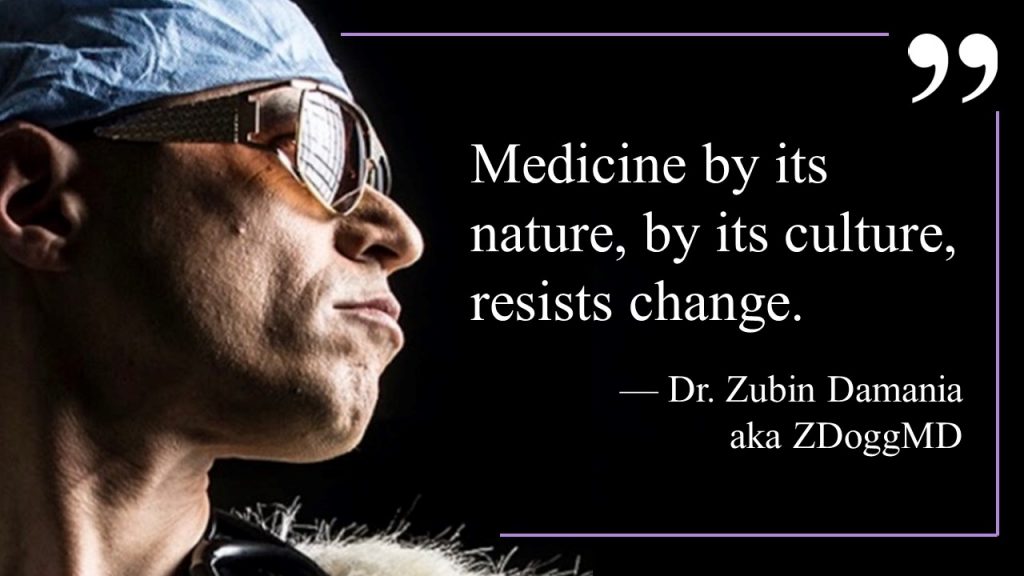Podcast: Play in new window | Download
Subscribe: Spotify | Email | RSS | More
In this episode, Fixing Healthcare hosts Dr. Robert Pearl and Jeremy Corr welcome their first returning guest, Zubin Damania, a physician and entertainer known to his legions of followers as ZDoggMD.
Damania hosts the internet’s No. 1 medical news and entertainment show, reaching tens of millions of people weekly. He is a leading voice for patient-centered healthcare, focusing on prevention and team-based medicine. He, along with Zappos CEO Tony Hsieh, started Turntable Health in Las Vegas as an alternative to the broken U.S. healthcare system.
Damania returns to Fixing Healthcare program to kick off season five, which focuses entirely on the culture of medicine, including as Dr. Robert Pearl puts it: “the good, the bad, the beauty, the ugliness, the things that inspire and the things about which we are embarrassed.”
Highlights from this interview with ZDoggMD
1. On the good parts of medical culture
“Ever since the first day of medical school … we start getting exposed to this culture, which is an adaptation of a group of humans to their environment and the challenges at hand. It’s a culture that values science and knowledge and learning. We value human connection. We value empathy, feeling someone else’s pain and then acting from it to alleviate suffering. Those are the real positives.”
2. On the bad parts of medical culture
“The culture of medicine is conformity- , inertia- and fear-based. There’s this high sheen of professionalism, which allows us less latitude to be authentically who we are, so we have to sensor how we behave under this perception that, ‘Oh, that’s not professional’ … and there’s this idea that if you deviate too much from the standard practice, you will be squashed.”
3. On how money makes doctors fear change
“Part of the culture of medicine is that our payment models have changed how we actually view what is right and wrong. And that’s been a real problem in moving forward with any kind of real change in medicine. So, medicine by its nature, by its culture, resists change.”
4. On nurses vs. doctors
“Let’s just look at doctors and nurses. Wow. Here’s a team. They cannot exist without each other. And then you drill into how different they are … You have this really interesting dynamic. Because you have a power hierarchy, you have a gender hierarchy, you have a difference in how they see the world.”
5. On medicine’s generational differences
“There’s this old saying, ‘Medicine changes one retirement or one funeral at a time.’ That’s because the old guard changes and the new guard comes in. What I’m starting to see now, culturally, is, medicine used to be a little more professionally conservative. That’s starting to open up and change. There’s a lot more push in the younger generation to consider issues around, say, climate change, social justice, race, inequity, social determinants of health, than there were in the older generation.”
6. On whether medical culture will change after Covid-19
“If I’m being fully honest, I have a lot of skepticism that anything will change. Even a disaster like this, what I think will happen is we’ll fire up the retrospectoscope and we’ll look back and be like, ‘Ah, we probably overreacted to this thing and under-reacted in certain ways. We didn’t keep our frontline troops safe with PPE. Our administrators, who had one job, which is to prepare us and keep us staffed, didn’t really plan for this. We’ll try to do better next time.’ And people will just go back to a business as usual. Overall, I’m very skeptical that the culture will change.”
7. On specialists vs. primary care physicians
“The power dynamic between specialists and primary care is one of the oldest and most interesting. There’s a perception in the culture of medicine that specialists tend to view primary care people as the weak medical students, the people who couldn’t get the board scores or the rotation honors to become a specialist. Because why would you do primary care? It’s miserable, you don’t get paid enough. It’s just drudgery. You never get to really do anything smart. These are perceptions.”
READ: Full transcript of our latest discussion with ZDoggMD
Listener note: Years of research and reporting on the culture of medicine will culminate in the publication of Dr. Robert Pearl’s 2021 book titled, “Uncaring: How Physician Culture Is Killing Doctors And Patients.” To learn more, subscribe to his newsletter Monthly Musings on American Healthcare.
* * *
Fixing Healthcare is a co-production of Dr. Robert Pearl and Jeremy Corr. Subscribe to the show via Apple Podcasts or wherever you find podcasts. Join the conversation or suggest a guest by following the show on Twitter and LinkedIn.


Comments are closed.